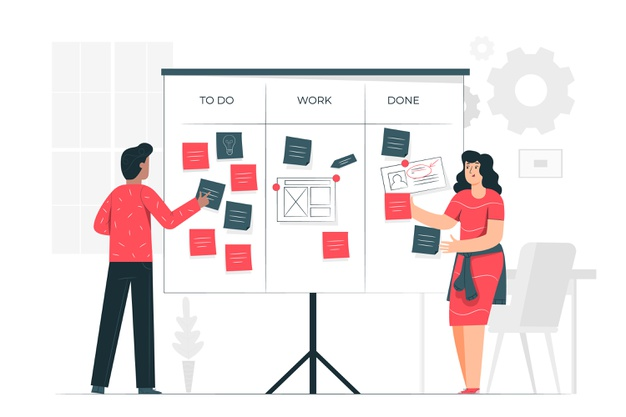
To become a project manager, you must know about project management. Let’s start by understanding what a project is. A project is the making of a product, and the process required to make the product is project management. For example, the project can be developing new software or building a new facility. At the same time, there also can be several projects that a business can work on at a time.
Project management, thus, is understanding the need for the product. Like planning and also implementing the product production. Project management does this by using knowledge, skills, resources, tools, and techniques. Overall, project management falls into five steps:
- Firstly, starting a project,
- Secondly, planning and executing,
- Thirdly, monitoring and controlling
- Finally, finishing up the project.
Consequently, project management makes work more systematic, organised, and also time-friendly.
The key areas of project management are:
- To identify a problem and figure out a solution or product for it.
- To define the quality of the deliverables
- Estimating required resources
- Estimating the time
- Planning budgets, investment, corporate agreement.
- Implementation of the management plan on to the project
- Team management and motivation
- Risk management and change in the project
- Maintain sustaining project
- Monitoring
- Marketing the product
- Closing the project.
Specifically, the thing about project management is that there is no one way to do it. There are different types of project management systems. Here are three widely used project management techniques for you:
Waterfall Project Management
In the waterfall project management system, the project goes through a sequential process. There are several different stages of this process, and it takes place step by step. Therefore, no step begins until the ongoing step is finalised. Once a new phase begins, you and your team cannot go to the previous stage.
Moreover, this method follows strict rules depending on the demand of the project. Industries like manufacturing and construction use waterfall management. The team must have access to proper instruction, which they must abide by. All team members should know their instructions and also know what they are required to do.
Agile Project Management
Agile project management is an interactive process for managing a project. It focuses on dividing large projects into smaller achievable tasks. Agile methods help to complete the project faster. You can put in place changes quickly and also increases the productivity of the work.
Initially, software development companies used the agile method. Industries like marketing, IT, and automation are also implementing it. Even militaries and some university administrations also use agile project management.
Lean Project Management
Lean project management is a philosophy that Toyota Production System initiated. The core goal of this management is to enhance customer value and minimiseorganises waste. As a result, you can create more value for customers using fewer resources.
An industry that uses the lean method benefits from reduced lead time, low inventory, and costs. Furthermore, it enhances productivity and quality. IT, construction, education, fashion, and many other industries using lean project management.
What is The Meaning of a Project Manager?

A project manager is like a leader who leads a team to do a particular goal or project. They also hold the responsibility of achieving a project. So project manager does this through the following stages:
- Firstly, planning,
- Secondly, executing,
- Thirdly, monitoring and controlling, and
- Lastly, putting all the pieces together to make a complete product.
Project managers consult with their seniors and know their goals for the project. They also understand the clients and product needs. Therefore, the manager designs an efficient and comprehensive road map for the project.
Moreover, the manager organizes and distributes the project between team members and assists their work. The project manager also manages resources and looks at the overall progress. They are held liable for the project’s completion and have to answer any problem with the project.
Despite this, the job of a project manager is full of adventure. So if you are great at leadership, organising, and planning, this job is exactly the thing for you. Project managers are team workers, and they also have to be social, formally, and informally.
Specifically, project managers bear instructions and messages from higher authorities and clients. Then they pass them to the project team, gather project updates, and take them back to the higher power. To be a successful project manager, you have to be a complete package. As a result, you have to be a leader, co-worker, and supervisor all at the same time. You also must have the problem-solving capability. As a project manager, you need to have good ideas of project management systems and software.
Who are the Employers of Project Managers?
From a 2017 report by Project Management Institute, the industries that are hiring project managers most are :
- Manufacturing and construction
- Information services and publishing
- Finance and insurance
- Management and professional services
- Utilities
- Oil and gas
Other industries also look for project managers from time to time.
Above all, it is a dynamic profession and changes with each project and demand. Each project is different. So you need to adapt, interact with people, and have a strong knowledge of the industry. If you can do all these, being a project manager is definitely worth your professional time.
What are the responsibilities of a project manager?

The responsibilities of a project manager vary each day. They coordinate all the ongoing activities of the project. Hence, their actions also change depending on each day’s needs. So the project management process focuses on ten broad knowledge area:
- Integration management
- Communications management
- Cost management
- Quality management
- Time management
- Resource management
- Scope management
- Risk management
- Procurement management
- Stakeholder management
Therefore, project management depends on the stages and knowledge to do a project. As a result, here are some common and essential responsibilities of a project manager.
Initiating Project Stage
Firstly, the project managers take orders from seniors and clients. They understand the project and its needs. Therefore, they set the goals, mission, and vision of the project.
- Project managers are supposed to take a concept and also turn it into a workable project plan.
- Initiates and understands the need of the project.
- Establishing and managing project expectations with external and internal stakeholders.
- Doing project-related research and case studies.
- Direct all the project management stages.
Planning Project Stage
Secondly, in this stage, the project manager plans everything. They check and form a road map for the project.
- Designing a detailed, efficient and sustainable project management plan.
- Doing scope management, creating work breakdown structure, and requirement gathering.
- Managing time by planning, specifying, and developing schedules, tasks, estimating resources and timeframes
- Doing cost management by planning, estimating, and determining the required budget.
- Planning and identifying quality requirements for the project.
- Estimating the required workforce’s qualities and number depends on the project task.
- Planning a highly effective communication process.
- Identifying possible risk factors of the project.
- Making strategies for minimizing the potential risk.
- Making procurement management plans by managing resources and identifying required procurements.
- Planning for stakeholder expectations.
Executing Project Stage
Thirdly, the project manager starts executing the plan in this stage. They form tasks according to the project need and divide them into teams.
- Instructing and managing all work for the project.
- Ensuring quality of all the tasks done for the project.
- Selecting, assigning tasks, and managing the most suitable team members for the project.
- Ensure there is clear communication between the manager and the team members.
- Take proper measures to do stock inventory with necessary resources.
- Keep communication and manage stakeholder’s expectations.
- Develop professional business relationships.
Monitoring and controlling Project
Fourthly, the project manager everything is going as planned. They watch over every step and process of the project.
- Prioritize the task of the project
- Supervise the project work and manage any changes required.
- Controlling, mentoring, and motivating team members.
- Manage projects through key performance indicator (KPI)
- Confirm if the tasks are completed in order of the preplanned scope of the project and review it.
- Ensuring everything is done in the allotted time. It is done by tracking time and maintaining daily timesheets.
- Create and continuously update the project documentation.
- Maintaining the resources and controlling the budget.
- They ensure the budget doesn’t exceed estimation.
- Making sure all the team members have instruction and also all the information they need.
- Ensuring work quality by having a quality assurance team.
- Controlling resource and stakeholder engagements.
- Report any kind of issues to the management when necessary.
- Conduct project status meetings, daily stand-ups, and individual meetings.
- Make recommendations for project improvements.
Closing Project
Lastly, the project manager does the final check of the plan.
- Then they see if the project is accomplished as planned.
- They do regular follow up on the progress, risks, and opportunities of the project.
- They also focus on customer satisfaction and get customer input.
- Act as the primary customer contact for project activities.
- Measure project performance using appropriate systems, tools, and techniques.
- Lastly, they see all the phases, do quality checks, and close all the project procurement.
That was one extensive list. But if you get working as a project manager, this will be your ordinary day-to-day task.
What is the Work Schedule and Salary of a Project Manager?

The project manager’s position is a full-time 9 to 6 job. It hardly varies. But you may need to do overtime sometimes. It usually occurs when there are close deadlines and emergencies. Project managers generally work 40 hours a week.
Throughout the UK, the average salary of project managers ranges from £44,000 to £45,000. The entry-level positions of project managers earn approximately £30,000. It can rise to £65,000 as they get a promotion. Below you will find the average income of project managers in different positions.
- IT Project Manager- £52,000
- Project Coordinator- £28,000
- Project Management- £46,000
- Senior Project Manager- £61,000
- Assistant Project Manager- £33000
For countries like the US and Canada, the project manager’s average salary is $72,000 and $82,000, respectively. Other different factors may cause variation in the pay of project manager, and they are:
- Firstly, the industry where the project manager is working or looking to work.
- Secondly, years of experience in terms of seniority.
- Thirdly, areas of specialisation, certifications, etc.
- Fourthly, the location of the job market in terms of country or demographics.
- Lastly, the budget of the project.
What Are The Required Skills and Competencies for Project Manager?

A project manager is a leader who needs to have many skills and competencies. They have to be prepared to manage a project and also do all the required tasks. Provided that, below is a list of skills necessary for a project manager:
- Business management skills
- Leadership skills
- Organisation skills
- Time management skills
- Cost management skills
- Critical thinking skills
- Problem-solving skills
- Communication and negotiation skills
- Adaptability
- Analytical skills
- Self-motivation
- Accuracy and attention to details
- Decision-making and ability to work under stress
- Strong interpersonal skills
- Ability to define situations, document data, and draw conclusions
- Knowledge of project management tools
- Work ethics
- Creativity
How to Become a Project Manager?

Now that you know all the basics of the project manager position and what you can expect from it. Let us start our journey to become a project manager.
All careers and occupations need you to work on it, and project managers are no different. Moreover, they have to learn and brainstorm and create new ways to complete a project. So after reading this guide, you have to understand and build your skills. Thus take necessary education or certification courses to develop skills.
There are two ways you can try to become a project manager.
- You can start from an entry-level position in a company. Then you can develop project management experience and skills in that industry. After that, go up the ladder and try to get a project manager position. Let’s name this, Go up the Ladder or Accidental Project Manager.
- If being a project manager is your sole purpose, then educate yourself on the industry. To do so, gain skills and aptitude, get a certificate or degree if possible. Next, apply directly for a project manager role. We can name this Traditional Project Manager.
The purpose of naming the two ways is to explain them in detailed steps. Let us start with the first one.
Go up the Ladder or Accidental Project Manager
This process is for people who have already entered the corporate world. Thus, you might already find yourself taking project manager duty. But you do not have the required skills and want to improve. Team leaders, seniors, or other managers may find themselves doing project management.
Most importantly, without any actual knowledge, project management can be tricky. If you find yourself in this position willingly or unwillingly, do not worry. Though project management seems complicated, it is manageable. Here is what you can do to be a successful project manager.
Step 1: Take notes of your experiences you already have and skills that need work.
Your time working in a company will give you lots of project management experience. The team you worked with and the projects you worked for may have taught you many things. Significantly, the experience and knowledge on the job you do will support you. Reflect on those. Additionally, create a concrete idea of the experience and skill you have gained and need to work on.
Another key point is to check if you have the following knowledge on project management:
- Integration management,
- Communications management,
- Cost management,
- Quality management,
- Time management,
- Resource management,
- Scope management,
- Risk management,
- Procurement management
- Stakeholder management.
You may find that you already have knowledge and expertise in many of these skills. You also may have gained experience in communication and time management as well. The main purpose of this is to determine what skills you already have and new things. As a result, you can fill up the knowledge gap you have to know to do project management success.
After that, you can make a plan to fill knowledge gaps. Take advantage of the opportunities in the job. You also can start taking courses to develop yourself as a project manager.
Step 2: Seek learning opportunities.
When you want to learn project management skills, first seek the help of your co-workers. Secondly, talk to other project managers and seek their opinions. Then also try to understand their professional journey. Ask advice from them and try to join associations like PMI. They will all help you learn the things that you need.
If you are confident to learn skills on your own, you can find many courses online. There are also books on project management and thousands of articles on the internet.
You can also go for formal training or enrol in a certification course. In that way, you will have an edge to become a more successful project manager. A certification course will help you get the qualities of a project manager. Many courses of One Education will help you guide you into project management.


![]() 22 minutes
22 minutes


![]() 22 minutes
22 minutes